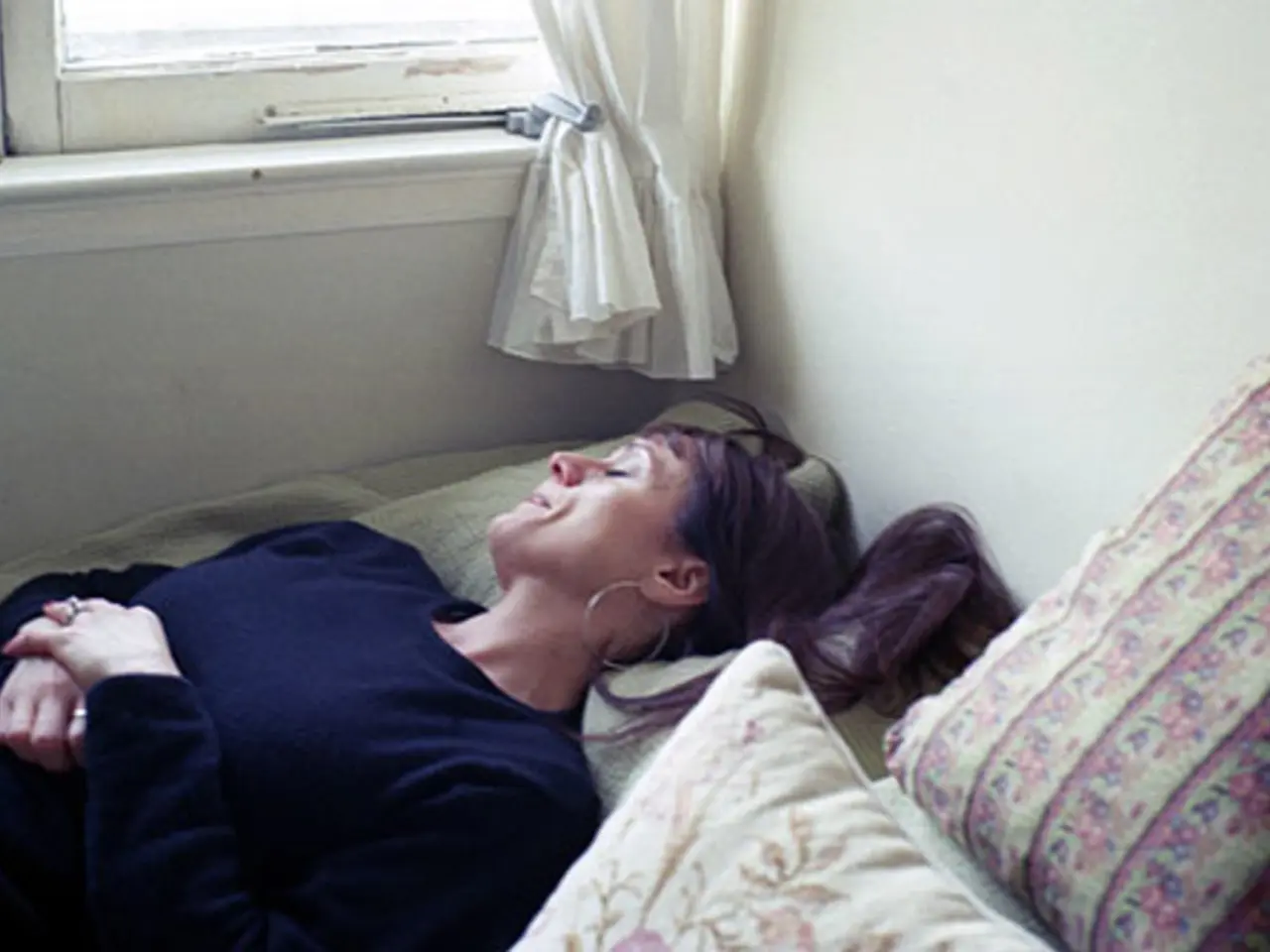Alternative methods for obtaining restful sleep, including substitutes for Xanax, are discussed.
Xanax, a popular medication used to treat anxiety and panic disorders, has been found to enhance the effect of gamma-aminobutyric acid (GABA), a neurotransmitter that calms brain activity [1]. However, it's important to note that Xanax is an addictive medication, and if a person feels they are becoming dependent on it, they should seek help from an addiction center or their doctor [2].
The Food and Drug Administration (FDA) has only approved Xanax for the treatment of panic disorders and anxiety. For insomnia, the FDA recommends several alternative treatments that are considered safer or more effective than Xanax. These alternatives include:
- Dual Orexin Receptor Antagonists (DORAs): Drugs like Quviviq, Dayvigo (lemborexant), and Belsomra (suvorexant) block brain chemicals that promote wakefulness, helping patients fall asleep and stay asleep with fewer side effects such as cognitive impairment or daytime sedation compared to benzodiazepines [1][3].
- Nonbenzodiazepine Sedative-Hypnotics ("Z-drugs") such as Ambien (zolpidem), Lunesta (eszopiclone), and Sonata (zaleplon) are FDA-approved for short-term insomnia treatment and have generally lower dependence risks than benzodiazepines [1][3][4].
- Melatonin Receptor Agonists, like Ramelteon (Rozerem), act on melatonin receptors to regulate sleep-wake cycles, useful especially for sleep onset insomnia but may be less potent than DORAs [1][3].
- Low-Dose Antidepressants such as Doxepin (Silenor), a low-dose tricyclic antidepressant, is FDA-approved for sleep maintenance insomnia and can be an option, though used cautiously due to side effect profiles [1].
- Cognitive Behavioral Therapy for Insomnia (CBT-I) is a first-line treatment, using behavioral methods and mental strategies to improve sleep without the risks related to medications like dependence or tolerance [2].
Because benzodiazepines like Xanax carry high risks of dependence, tolerance, and adverse effects, newer FDA-approved alternatives such as DORAs and CBT-I are now preferred for insomnia treatment due to improved safety and efficacy profiles [3][2].
In addition to these treatments, lifestyle changes can also help improve sleep. A person should avoid lying in bed awake for more than 20 minutes at a time, stay away from products that contain nicotine, and go to bed and wake up at the same time throughout the week. Establishing a bedtime routine, avoiding screen time and bright lights before bed, and exercising regularly during the day can also help improve sleep [5].
Moreover, natural supplements such as Green Tea and Matcha (ground-up green tea leaves) may help promote relaxation and reduce anxiety. Green tea contains L-theanine, which may help increase mental clarity while suppressing caffeine-induced alertness [6]. Matcha has been found to reduce anxiety in both mice and humans [7].
If a person thinks they are depending on Xanax to cope with day-to-day life, they should contact an addiction support service for more information and assistance. If medications or supplements are not working, a person should talk to their doctor about CBT or alternative medications over Xanax [8].
It's crucial to remember that everyone's body reacts differently to medications and treatments, so it's essential to consult with a healthcare professional before making any changes to your sleep routine or medication regimen.
References:
[1] American Academy of Sleep Medicine (2020). Insomnia Disorders: Practice Parameters With Agreements and Disagreements Among Experts. Sleep. 43(5):zaba039.
[2] American Academy of Sleep Medicine (2020). Cognitive Behavioral Therapy for Insomnia: Practice Parameters With Agreements and Disagreements Among Experts. Sleep. 43(5):zaba040.
[3] American Psychiatric Association (2018). Practice Guideline for the Pharmacological Treatment of Patients With Insomnia and Insomnia Disorder. American Journal of Psychiatry. 175(7):607-616.
[4] National Institute on Drug Abuse (2021). Benzodiazepines and Sedative-Hypnotics. Retrieved from https://www.drugabuse.gov/publications/drugfacts/benzodiazepines-sedative-hypnotics
[5] National Sleep Foundation (2020). Good Sleep Hygiene: What It Is and How to Practice It. Retrieved from https://www.sleepfoundation.org/articles/good-sleep-hygiene-what-it-is-and-how-to-practice-it
[6] Nobre, A. C., Rao, A., & Owen, G. N. (2008). L-theanine, a natural constituent in tea, and its effect on mental state. Asia Pacific Journal of Clinical Nutrition, 17(1), 50-55.
[7] Lee, S. J., Lee, J. S., & Kim, S. S. (2015). Effects of Matcha Green Tea on Mood and Cognition of Healthy Young Adults. Journal of Clinical Psychology in Medical Settings, 22(3), 265-270.
[8] National Institute on Drug Abuse (2021). Xanax (Alprazolam). Retrieved from https://www.drugabuse.gov/publications/drugfacts/xanax-alprazolam
- The Food and Drug Administration (FDA) recommends Dual Orexin Receptor Antagonists (DORAs) for safer and more effective treatment of insomnia, as opposed to Xanax, due to fewer side effects and lower dependence risks.
- Nonbenzodiazepine Sedative-Hypnotics like Ambien, Lunesta, and Sonata are alternative FDA-approved medications for short-term insomnia treatment, offering lower risks of dependence compared to benzodiazepines like Xanax.
- Melatonin Receptor Agonists, such as Ramelteon, are useful for sleep onset insomnia, though they may be less potent than DORAs, providing an alternative to Xanax for some individuals.
- Low-Dose Antidepressants like Silenor can be an option for sleep maintenance insomnia, though side effect profiles should be considered carefully, making it a less common alternative to Xanax.
- Cognitive Behavioral Therapy for Insomnia (CBT-I) is a first-line treatment for improving sleep without the risks related to medications like dependence or tolerance, providing an effective alternative to Xanax for managing insomnia.
- Lifestyle changes, such as avoiding lying in bed awake for extended periods and establishing a bedtime routine, can improve sleep without the need for Xanax or other medications.
- Natural supplements like Green Tea and Matcha may help promote relaxation and reduce anxiety, offering a potential alternative to Xanax for managing anxiety symptoms.




